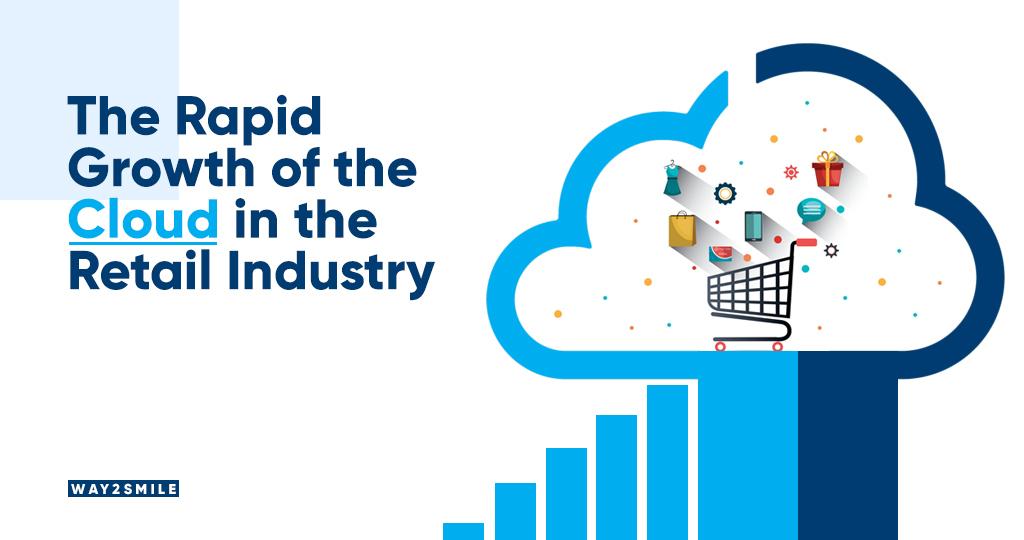
The Rapid Growth of the Cloud in the Retail Industry
Cloud tech is no longer jargon. Thanks to the Silicon Valley expansion, cloud solutions are more relevant and practical at the present than ever. The exponential boom in user-friendly electronics paved way for the increased dependency on the ‘cloud’. The cloud market is huge. It is expected to reach $832 billion in the next 4 years.
The market share of the cloud services pre-pandemic was on the positive side but there is no doubt that the recent COVID-19 pandemic increased our dependency on cloud services. Businesses were forced to find the sweet spot between employee safety and productivity.
Among the businesses that successfully survived the pandemic with no/minimum damage, many of them have devised some sort of cloud-based strategy to stay in the game. Many local businesses have increased their revenue by establishing a strong digital presence that puts cloud services at their core.
Read Also – Role of Cloud Computing in driving Digital Transformation
Are cloud services fueling the retail market?
For a second, let us take the pandemic out of the equation. Pandemic acted as a catalyst for the businesses to adopt a cloud strategy, nobody denies that. But even before an external factor came into the mix, the market was moving towards cloud-based services.
The retail industry puts the customer at its core. The entire industry revolves around the customer’s needs and wants. Their operations are designed to facilitate customer engagement and to build loyal brand advocates. With such stakes, the retail industry was hesitant to adopt a digital strategy. But it soon broke that myth as technologies like Artificial Intelligence, Predictive Analysis, Machine Learning, etc. provided a more personal experience to the customers.
Cloud services allow this integration without draining too many resources. To be a customer-centric business is to optimize data management. cloud application development companies simplify this process through intensified cloud solutions . Retail industries collect tons of unorganized data that needs to be processed to draw effective conclusions. Not everyone could invest an in-house IT team to tackle these problems.
The impact of big data on market is too big to miss! There is a common misconception about big data among businesses. They think that big data is their one-stop solution for all their existing problems. The reality is completely different.
To effectively use big data, a solid IT infrastructure is required. The process of extracting useful data from the data mountain demands raw computing power. This is where cloud tech proves to be useful.
Using cloud tech, retail businesses can process tons of data to extract information that helps them form effective decisions. Effective data processing leads to precise customer engagement which in turn increases the revenue of the business.
Cloud computing also helps you in managing critical data of the retail stores. It could be employee salary, resource availability, stock availability, inventory efficiency, pricing, and a lot more.
Imagine the amount of data one has to surf through if they have 1000 stores in a country. To manage these data efficiently. Cloud computing is the only solution.
Read Also – Prediction: 80% Of Enterprise IT Will Move To The Cloud By 2025

What drives the growth of cloud in the retail industry?
A technological revolution in the retail industry is much awaited and can boost the market share effectively. Optimization is the keyword for the 21st century.
The need for businesses to get a 360-degree view of their inventories and operations is one of the main reasons why retail industries are focusing on cloud technologies.
It is impossible to talk about digitalization without the impact of the recent pandemic. The recent pandemic has forced these retail businesses to find a way to provide their services despite the guidelines and lockdowns.
Retail industries mostly constitute the basic needs that people would require daily. When a lockdown is imposed, the demand for these basic needs increased.
Businesses are forced to bypass these restrictions and continue providing their services. Cloud technology can help you run a complex piece of technology with minimal resources. This is a game-changer in the retail industry since the sector is facing potential deterioration.
Cloud computing can also help you increase the performance metrics of your digital services. For instance, many fashion websites will witness heavy web traffic during particular seasons.
If there is a sale going on, the stocks and inventory need to be updated within seconds. It is difficult to do all these while simultaneously maintaining the heavy web traffic.
A cloud computing model can increase the efficiency of the website and these metrics could be changed in a jiffy!
Take ManageTeamz as an example. It is a cloud-based software that optimizes the logistics and delivery operations of your business. Various devices can help draw data from a unified source. The data is instantly shared among the delivery executives and the task is carried out immediately. This makes the process of monitoring and tracking the products simple and easy. It can also store data from the delivery executive’s end and acts as a communication channel between the executives too!
Such feats are impossible without cloud services.

The future of cloud in retail
The future of cloud computing lies in the integration of various technologies. The digital age is fueling the innovation of various tech companies and creators.
IoT is on the rise. As more and more gadgets come under this bracket, it will be easy to establish a digital ecosystem in our homes, offices, workplace, shops, etc.
Artificial Intelligence is already a critical part of the shopping experience. Integrating this with the cloud can help streamline the purpose and produce accurate results.
Cloud Solutions can also help industries to monitor various metrics and compare them with the market standards to see where they stand.
Enhancing the supply-chain management can help in developing mutual trust among the customers. The integration also encourages maintaining transparency that helps build trust and create brand value.
Using a common cloud to monitor the entire schematics of the retail operations can revolutionize the way we shop. It can create smart stores that can automate even critical operations.
Read Also – Will Cloud Computing be the future of Enterprise Application Platforms?
Wrapping this up,
Combining cloud and retail industries opens up limitless opportunities. With the help of cloud technology, the industry is moving towards automation. Automating the retail industry can boost the market share of the sector and can help operate more efficiently. It is only a matter of time before the industry is transformed.

